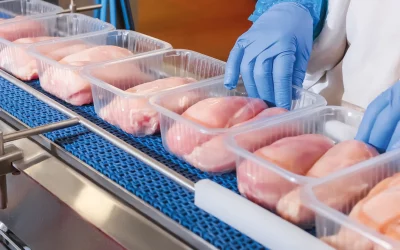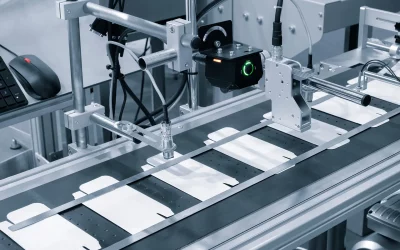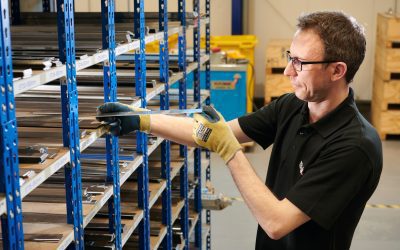Where are blades/knives used in food processing operations?
In order to select the correct blades and knives for your equipment, you should first identify where cutting applications are required in your overall food processing operation.
In general, food processing can be broken down into the following parts:
- Preparation/cleaning.
- Mechanical processing.
- Heat processing.
If you’re focusing on machines that use blades/knives, then you’ll mainly want to be looking at the preparation, mechanical processing and packaging parts of the operation.
Now let’s take a closer look at the blades that are used in each part of the food processing operation.
What blades/knives are used in the preparation and cleaning of food?
One of the main processes in the cleaning and preparation of food is peeling or skinning.
This involves removing inedible or undesirable material from sections of food in order to render it more visually appealing and/or edible.
To undertake peeling or skinning properly, you’ll need to select appropriate stationery or rotating blades.
Depending on what you are processing, you may want to select a foodstuff-specific blade. For example, potato processing knives are specifically designed to withstand the fast-pace associated with potato processing.
Likewise, if you’re preparing meats, then you’ll want to invest in blades specifically designed for these foodstuffs, such as debleeder blades and dehiding blades.
It’s also useful to invest in skinner blades, as they can be ideal for the cleaning of fish and meats.
What blades/knives are used in the mechanical processing of food?
The mechanical processing part of food processing involves several different types of blade (depending on the exact foodstuffs you’re dealing with).
Mechanical processing can be broken down into distinct operations.
Size reduction
As the name suggests, this form of mechanical processing involves reducing the average size of foodstuffs using methods such as compression, shearing or impact force.
To do this, you may wish to use knives such as involute slicers, bandsaw blades, bone processing blades, circular slicers, cutoff blades, dicer blades, and portioning blades. Which blades are suitable will be mainly based on what parts of the carcass you are processing.
Mixing
Another operation that falls within mechanical processing is mixing or blending. This is the process of combining two or more foodstuffs in order to achieve a uniform mixture.
Should mixing be part of your food processing operations then you’ll want to select high-quality blades for your bowl choppers, sigma-blade mixers and/or cutter mixers.
What blades/knives are used in the packaging of food?
When it comes to the packaging of your food, blades play a particularly important role here too.
It’s equally important that you select packaging knives that are compatible with your machines. Here at MRMK, we offer a huge range of packaging blades that are designed specifically for all main types of packaging machine such as tray sealers, baggers, flowrappers and more.
What properties should food processing knives/blades have?
Now that we’ve looked at the different types of blades that are used throughout the typical food processing operation, let’s examine the characteristics you should be looking for when buying new blades for your food processing machinery.
Blade characteristics
When you’re investing money in new machine blades, it’s vital that you select blades which are going to provide a consistent cut, time after time, retaining their sharpness and therefore effectiveness.
To ensure you buy knives which possess these characteristics, you want to look for two things:
- Blade material hardness.
- Blade material toughness.
Whilst these may sound like the same thing, they’re not. It’s these two characteristics which combine to great long-lasting, sharp knives.
Hardness refers to the density of the metal used to make the blade. Generally, the harder a metal is, the longer it will retain its integrity.
But, how can you tell how hard a blade is?
The easiest way of checking how hard a blade is, is to check its Rockwell scale number. The Rockwell scale is a hardness scale based on the indentation hardness of a metal.
The higher a blade’s Rockwell number, the harder it is essentially.
But, just because a blade is hard doesn’t mean it’ll retain its edge. That’s where blade toughness comes in…
Toughness refers to how well a blade will resist erosion and therefore blunting. A blade’s toughness can be measured by its transverse rupture strength (TRS). This is a test which measures the amount of stress a material can handle before it fails.
So, the higher a blade’s transverse rupture strength score, the tougher it is.
Is the answer to just buy a blade with the highest Rockwell scale number and TRS score then? Unfortunately not, as TRS and Rockwell scores are inversely proportional.
Instead, you need to find a blade manufacturer such as MRMK that is adept at creating blades that have the perfect balance between hardness and toughness.
Precision engineering
In addition to checking that a blade is appropriately hard and tough, you also want to check that your prospective blades are precision engineered.
Think of it this way; they are going to have to go through thousands of cycles, often cutting tough foodstuffs.
If they are not manufactured in a way that ensures a perfect fit with your machinery, you can quickly find the blades and/or machines breaking, leading to unplanned downtime.
Whilst the answer to this problem has traditionally been to source OEM blades from the machinery manufacturers themselves, this is no longer necessary.
Why? Because companies such as MRMK are adept at creating precision-engineered blades that are perfectly compatible with your machinery.
Appropriate coatings
It can also pay to select food processing blades which have appropriate coatings.
Choosing knives which have appropriate coatings for your applications can not only mean that the knives will last longer, but can also deliver other benefits such as providing consistent cut quality, prevention of adhesive build-up, improved release properties and more.
At MRMK we manufacture our food processing blades from food-safe stainless steel which will remain rust free and which are approved for food contact.
What’s more, at MRMK we are able to manufacture custom knives that exactly meet your requirements. So, if you have something particular in mind, contact us today.
Time for new cutting tools for your food processing operations?
We hope you’ve found our guide to choosing the right cutting tools for your food operations helpful.
If you’ve read this guide and decided that it’s time for new blades for your food processing machinery, then speak to MRMK today.
We manufacture blades and knives for a huge range of poultry, meat, seafood, fruit and vegetable cutting applications.
Find out more about MRMK’s food processing blades now
For more food processing blade and knife advice, explore the MRMK news and insights hub…
Everything You Need to Know About Industrial Meat Processing and Packaging Knives | Food Production Trends You Need to Know in 2022 | Packaging Sustainability Trends for the Food Industry


 +44 (0) 1909 519815
+44 (0) 1909 519815 


